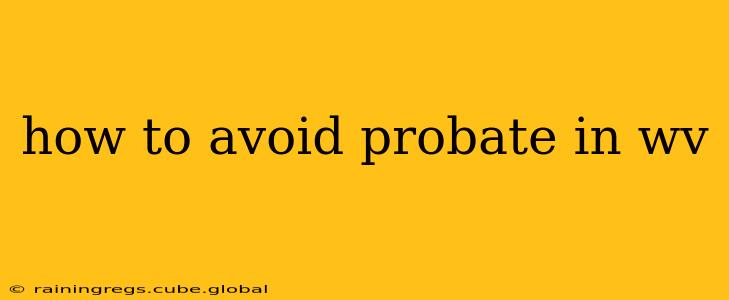Probate, the court-supervised process of administering a deceased person's estate, can be time-consuming, expensive, and emotionally draining. Fortunately, there are several ways to avoid probate in West Virginia, offering a smoother transition for your loved ones after your passing. This guide explores these options, clarifying the benefits and considerations for each.
What is Probate in West Virginia?
Before diving into avoidance strategies, let's briefly define probate in West Virginia. It's the legal process where a court oversees the distribution of a deceased person's assets according to their will (if one exists) or state intestacy laws (if there's no will). This involves identifying assets, paying debts and taxes, and finally distributing the remaining assets to heirs. The process can be lengthy, often taking months or even years, and involves fees paid to an executor or administrator and legal professionals.
How to Avoid Probate in West Virginia: Key Strategies
Several legal tools can help West Virginians avoid the probate process. Let's examine the most common and effective methods:
1. Transfer on Death (TOD) Deeds and Accounts
This is perhaps the simplest way to bypass probate for certain assets. A TOD deed designates a beneficiary who inherits property ownership upon your death. Similarly, TOD accounts (like bank accounts, brokerage accounts, and retirement accounts) specify a beneficiary who automatically receives the funds upon your passing. This avoids the court process entirely for these designated assets.
Advantages: Simple, inexpensive, and avoids probate delays.
Disadvantages: Only applies to specific assets; doesn't cover all property.
2. Living Trusts
A living trust, also known as a revocable trust, is a powerful estate planning tool that allows you to transfer ownership of your assets to a trust during your lifetime. You, as the grantor, retain control over these assets while alive and can modify or revoke the trust at any time. Upon your death, the trustee (the person you've appointed) manages the assets and distributes them to your beneficiaries according to the trust document, without court intervention.
Advantages: Avoids probate for all assets held in the trust; provides asset protection; allows for control over asset distribution even after death; can provide for incapacity.
Disadvantages: More complex to establish than TOD arrangements; requires ongoing administration.
3. Joint Ownership with Rights of Survivorship
This involves owning property jointly with another person, typically a spouse or child. Upon your death, ownership automatically transfers to the surviving joint owner without going through probate. This is particularly common for bank accounts and real estate.
Advantages: Simple and straightforward; avoids probate for jointly owned assets.
Disadvantages: Limits control over asset distribution after your death; may not be suitable for all relationships or assets.
4. Payable on Death (POD) Designations
Similar to TOD accounts, POD designations are commonly used for insurance policies and retirement accounts. The beneficiary designated on the policy or account receives the funds directly upon the death of the account holder.
Advantages: Simple, inexpensive, and avoids probate delays.
Disadvantages: Only applies to specific financial assets; doesn't cover all property.
Frequently Asked Questions (PAAs)
H2: What are the costs associated with avoiding probate in West Virginia?
The costs vary depending on the chosen method. TOD deeds and POD designations are generally inexpensive, involving minimal legal fees. Living trusts involve higher initial setup costs, including legal fees and potential trust administration fees. Joint ownership has relatively low setup costs but may have implications for taxation and control.
H2: How long does it take to set up a living trust in West Virginia?
The timeline depends on several factors, including the complexity of your assets and the responsiveness of legal professionals. Expect the process to take several weeks to a few months.
H2: Can I avoid probate for all my assets in West Virginia?
While you can't completely guarantee avoiding probate for every asset, proper planning utilizing a combination of TOD, POD, living trusts, and joint ownership can significantly minimize or eliminate the need for probate for the vast majority of your assets.
H2: Is it necessary to hire an attorney to avoid probate in West Virginia?
While not strictly mandatory for simpler methods like TOD/POD, it's highly recommended to consult with an experienced estate planning attorney in West Virginia. An attorney can advise you on the best strategy for your specific situation, ensure proper documentation, and prevent potential legal complications.
Disclaimer: This information is intended for educational purposes only and should not be considered legal advice. Consult with a qualified estate planning attorney in West Virginia to discuss your individual circumstances and determine the best course of action for your specific needs.
